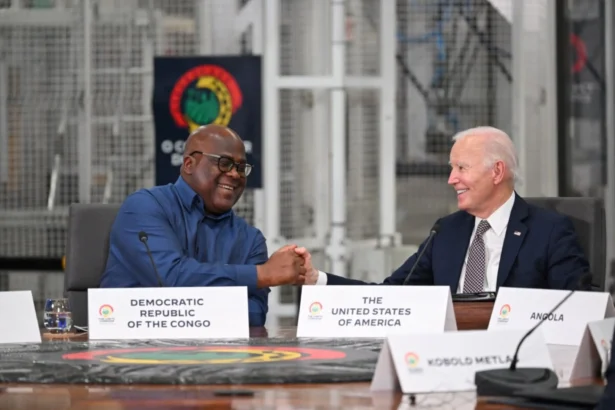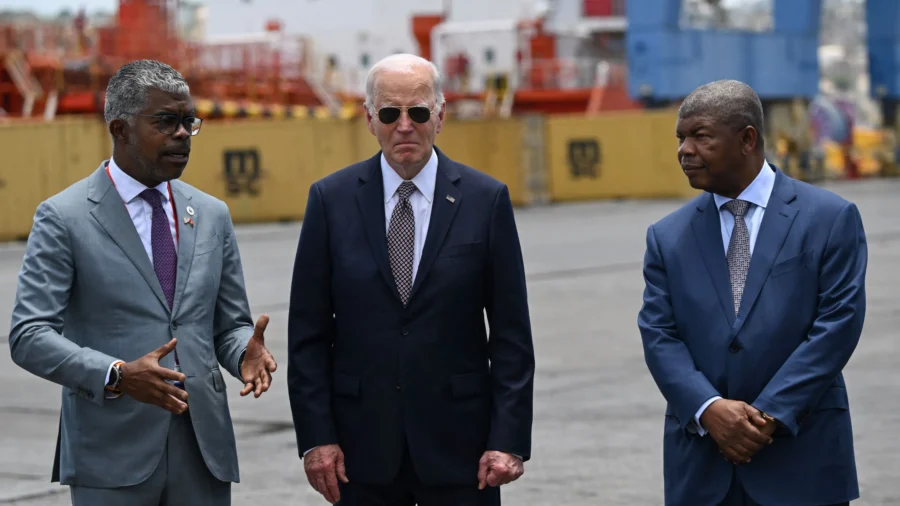LUANDA, Angola—On his final day in Angola, President Joe Biden traveled to the coastal town of Catumbela on Dec. 4 to visit a port terminal, a key site for his signature infrastructure project aimed at securing U.S. access to Africa’s rich mineral resources.
During the visit, Biden toured the Lobito port terminal and held meetings to review the progress made in the multi-billion-dollar railway infrastructure project, which is expected to play a significant role in shaping his legacy on the continent.
The Lobito Corridor project, which involves the refurbishment and expansion of the existing rail line, began last year with funding from the United States.
The nearly 1,000-mile railway project spans three countries, linking Lobito port to the mineral-rich areas of the Democratic Republic of Congo (DRC) and Zambia’s Copperbelt. It’s considered a major effort by Biden to respond to communist China’s Belt and Road Initiative (BRI, also known as “One Belt, One Road”) in Africa.
The BRI is considered a tool for Beijing’s so-called debt-trap diplomacy, which burdens many poor countries with enormous debt and eventually allows the Chinese regime to take control of their infrastructure.
During his visit, Biden participated in a summit hosted by President João Lourenço of Angola, alongside the presidents of the DRC and Zambia and the vice president of Tanzania.
“I like trains a lot,” Biden joked during the summit. He has earned the nickname “Amtrak Joe” for commuting by train from his home in Delaware to Washington for 36 years while in the Senate.
“We’re not just laying tracks,” Biden said. “We’re laying the groundwork for a better future for our people.”
Cargo that once took 45 days to get to the United States will now take less than 45 hours, he noted, calling it “a game changer” investment.
“So my message today is simple: Let’s keep it up,” Biden said.

Biden sought to frame the investment project not just as an opportunity for the United States to access critical mineral reserves in Africa but also as a way to expand the continent’s economic opportunities.
During Biden’s term, the United States has spent nearly $4 billion in this economic corridor. Other participants, including the Italian government, the Africa Finance Corporation, and the African Development Bank, also provided financing on a smaller scale.
“Collectively, this group mobilized over $6 billion in private and public investments,” Biden said.
During the summit, the U.S. president announced an additional $600 million in financing for the broader Lobito Corridor projects, which include investments in agricultural infrastructure, high-speed mobile networks, and railway upgrades.
During his visit, Biden stopped at a food processing plant owned by Carrinho Group, Angola’s largest food producer.
Sub-Saharan Africa holds about 30 percent of the world’s critical mineral reserves, according to the International Monetary Fund.
The DRC alone holds more than 70 percent of the world’s cobalt, an essential mineral used in batteries that power smartphones, computers, and electric vehicles. The conflict-wracked country is also the top copper producer in Africa.
Zambia also has abundant mineral wealth, particularly in its Copperbelt region, which is rich in copper and cobalt. The country is the second-largest producer of these two key metals in Africa, after the DRC.
Meanwhile, Angola has large reserves of oil and diamonds and is the second-largest oil producer in sub-Saharan Africa. However, the country is struggling with significant debt, including $17 billion owed to China due to the BRI. Angola is estimated to divert two-thirds of its oil production to service its China debt.
From The Epoch Times

